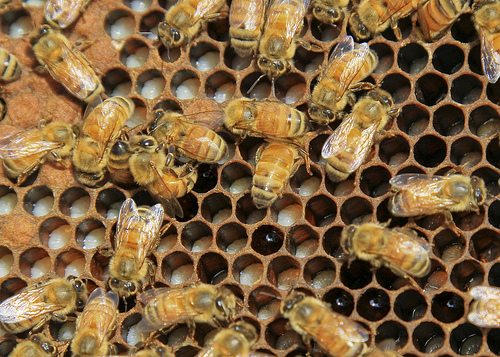

Economy
High Court refuses permission to challenge UK Government’s bee-harming pesticide decision
Friends of the Earth expressed disappointment and concern after the High Court today refused its application for a judicial review of the Government’s decision to allow banned bee-harming neonicotinoid pesticides to be used on oil-seed rape seeds in some parts of England this autumn. The environment group is now considering taking the case to the Court of Appeal.
Today’s High Court ruling relates to the legal process surrounding the Government’s decision in July this year – specifically whether it had satisfied the criteria for the temporary authorised use of the banned pesticide set out in European law. It does not concern the scientific basis for the restrictions on neonicotinoids, or the evidence of their harm to bees. Indeed there is clear and growing evidence that neonicotinoid pesticides are a significant threat to bees and other pollinators.
The High Court ruled that the evidence and advice provided to the Secretary of State for the Environment was sufficient for her to legally take a decision lawfully to grant the authorisations and that Friends of the Earth could not challenge this decision. But the judgment did not decide whether she had taken the right decision.
Reacting to the decision, Friends of the Earth bee campaigner Dave Timms said: “It’s extremely disappointing that our application to challenge the Government’s decision to allow the use of banned, bee-harming pesticides has been turned down. We believe this ruling is flawed, ignores important facts and gives too much credibility to pesticide industry evidence to support the use of its own products. We are now considering an appeal.
“Our legal challenge has revealed fundamental flaws with the decision-making process for these emergency authorisations, which was shrouded in secrecy until the government was forced to provide crucial papers to us.
“The Government’s decision was too dependent on evidence provided by the pesticide firms, who have a direct commercial interest in these chemicals and seeing the ban on neonicotinoids lifted. The Government must urgently address how it has handled its approval of the use of these chemicals or risk further undermining public confidence in its ability to safely regulate pesticides to protect bees and our environment.
“The delays in getting vital information from the Government to bring this case to court means that that even if we had gained permission to proceed, it would have been too late to prevent the seeds form being sown and bees from being exposed to risk this year.
”We can only hope that by next year, when the NFU and chemical companies say they intend making more applications to use bee-harming pesticides, the Government will have radically revised its process to ensure complete transparency, and will have read the latest scientific papers. We are certainly not ruling out further legal challenges in future.”
Friends of the Earth’s legal challenge raised a number of significant concerns about the decision-making process on pesticide authorisation, including:
• The limited extent to which non-chemical ways to control pests were considered. The court ruled that evidence provided by Syngenta and the NFU was sufficient to meet the legal requirements.
• That the advice of the DEFRA Chief Scientist that neonicotinoid treated seeds should only be given to farmers who had tried other non-chemical ways to control pests, was ignored.
• Whether, after having its initial application refused, the NFU was given advice by civil servants about how to write an application which would be acceptable and allow the government to meet the legal criteria set out by Europe.
• The court did not properly address Friends of the Earth’s concern that there was no safeguard to stop farmers who did not have a pest problem from using the treated seeds and ignored evidence that farmers are often not using all the available techniques to avoid the need to use bee-harming pesticides.
• That the choice for which parts of the country should receive neonicotinoid treated seeds (Suffolk, Bedfordshire, Cambridgeshire, Hertfordshire) was taken by the NFU and the pesticide firms and not chosen or examined by the DEFRA Chief Scientist or the government’s Expert Committee on Pesticides (who both recommended the application be accepted).


 Environment11 months ago
Environment11 months agoAre Polymer Banknotes: an Eco-Friendly Trend or a Groundswell?

 Features10 months ago
Features10 months agoEco-Friendly Cryptocurrencies: Sustainable Investment Choices

 Features11 months ago
Features11 months agoEco-Friendly Crypto Traders Must Find the Right Exchange

 Energy10 months ago
Energy10 months agoThe Growing Role of Solar Panels in Ireland’s Energy Future





























